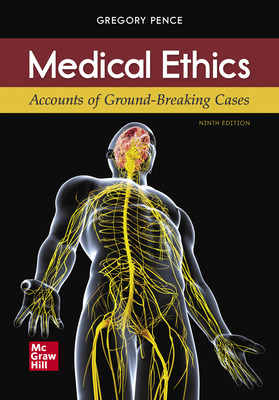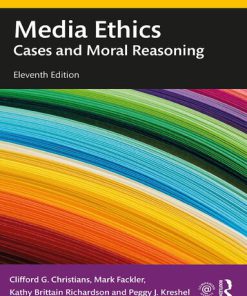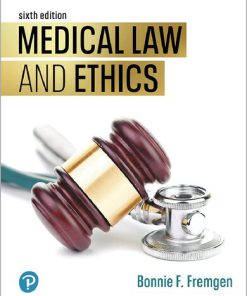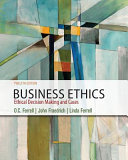Medical Ethics Accounts of Ground Breaking Cases 9th Edition by Gregory E Pence ISBN 9781260241044 1260241041
$50.00 Original price was: $50.00.$25.00Current price is: $25.00.
Medical Ethics Accounts of Ground Breaking Cases 9th Edition by Gregory E Pence – Ebook PDF Instant Download/Delivery: 9781260241044 ,1260241041
Full download Medical Ethics Accounts of Ground Breaking Cases 9th Edition after payment

Product details:
ISBN 10: 1260241041
ISBN 13: 9781260241044
Author: Gregory E Pence
Medical Ethics Accounts of Ground Breaking Cases 9th Edition Table of contents:
Chapter 1: Good and Bad Ethical Reasoning; Moral Theories and Principles
Chapter 1 Introduction
Good Reasoning In Bioethics
Giving Reasons
Universalization
Impartiality
Reasonableness
Civility
Mistakes in Ethical Reasoning
Slippery Slope
Ad Hominem (“To the Man”)
Tu Quoque (Pronounced “Tew-kwoh-kway”)
Straw Man/Red Herring
Post Hoc, Ergo Propter Hoc (“After This, Therefore, Because of This”)
Appeal to Authority
Appeals to Feelings and Upbringing
Ad Populum
False Dichotomy (“Either-Or” Fallacy)
Equivocation
Begging the Question
Ethical Theories, Principles, and Bioethics
Moral Relativism
Utilitarianism
Problems of Utilitarianism
Kantian Ethics
Problems of Kantian Ethics
Wrong versus Harming
The Ethics of Care
Virtue Ethics
Natural Law
Theories of Justice
Libertarianism
Rawls’s Theory of Justice
Marxism
Four Principles of Bioethics
Final Comment
Discussion Questions
Notes
Chapter 2: Requests to Die: Terminal and Nonterminal Patients
Chapter 2 Introduction
Elizabeth Bouvia, Larry McAfee, Brittany Maynard, Jack Kevorkian, Anna Pou
The Case of Elizabeth Bouvia (1983–Present)
The Legal Battle: Refusing Sustenance
The Case of Larry Mcafee (1985–1995)
The Case of Dax Cowart
The Case of Brittany Maynard (2013–2014)
Background: Perspectives on Dying Well
Greece and Rome
The Bible and Religious Views
Philosophers on Voluntary Death
The Nazis and “Euthanasia”
Hospice and Palliative Care
Dying in Holland
Jack Kevorkian
Dr. Anna Pou
Recent Legal Decisions
Oregon, 1994
Assisted Dying in Canada and Other Countries
More Americans Die at Home in Hospice, but Scandals Plague Hospice
Ancient Greece and the Hippocratic Oath
Ethical Issues
The Concept of Assisted Suicide
Misconceptions about Suicide
Rationality and Competence
Autonomy
Inadequate Resources and Poor Treatment
Social Prejudice and Physical Disabilities
Is Killing Always Wrong?
Killing versus Letting Die
Relief of Suffering
Slippery Slopes
Physicians’ Roles, Cries for Help, and Compassion
Implementing Physician-Assisted Dying
Mistakes and Abuses
Cries for Help
Further Reading and Resources
Nonterminal Patients Who Want to Die:
Physician-Assisted Suicide:
Discussion Questions
Nonterminal Patients Who Want to Die:
Physician-Assisted Dying:
Notes
Chapter 3: Comas: Karen Quinlan, Nancy Cruzan, and Terri Schiavo
Chapter 3 Introduction
The Quinlan Case
Pulling the Plug or Weaning from a Ventilator?
Substituted Judgment and Kinds of Cases
The Cruzan Case
The Terri Schiavo Case
Enter Lawyers and Politicians
What Schiavo’s Autopsy Showed
Ethical Issues
Standards of Brain Death
Chances of Regaining Consciousness from Coma and PVS
Post-Schiavo Developments, 2005–2020
Terri’s Chances of Re-awakening
Compassion and Its Interpretation
Religious Issues
Nagging Questions
Disability Issues
Some Distinctions
Advance Directives
The Schiavo Case, Bioethics and Politics
Further Reading and Resources
Discussion Questions
Notes
Chapter 4: Abortion: The Trial of Kenneth Edelin
Chapter 4 Introduction
Kenneth Edelin’s Controversial Abortion
Background: Perspectives On Abortion
The Language of Abortion
Abortion and the Bible
The Experience of Illegal Abortions
1962: Sherri Finkbine
1968: Humanae Vitae
1973: Roe v. Wade
Ethical Issues
Edelin’s Actions
Personhood
Personhood as a Gradient
The Deprivation Argument: Marquis and Quinn on Potentiality
Viability
The Argument from Marginal Cases
Thomson: A Limited Pro-Choice View
Feminist Views
Genetic Defects
God Must Want Me to Be Pregnant, or Else I Wouldn’t Be
A Culture of Life or a Culture of Death?
Abortion and Gender Selection
Abortion as a Three-Sided Issue
Antiabortion Protests and Violence
Live Birth Abortions and How Abortions Are Done
Fetal Tissue Research
Emergency Contraception
Maternal versus Fetal Rights
Viability
The Supreme Court Fine-Tunes Roe v. Wade
Partial Birth Abortions
States Restrict Abortion Clinics
Self-Administered Abortion by Telemedicine
THE SUPREME COURT OVERTURNS ROE V. WADE
Harassment and Violence Increases at Abortion Clinics, 2013–2019
Emergency Contraception
NEW CONTROVERSIES ABOUT ABORTION PILLS
FINAL COMMENT
Further Reading
Discussion Questions
Notes
Chapter 5: Assisted Reproduction, Multiple Gestations, Surrogacy, and Elderly Parents
Chapter 5 Introduction
The Octomom and The Gosselins
Louise Brown, The First Test Tube Baby
Harm to Research from Alarmist Media
Later Developments in Assisted Reproduction
Sperm and Egg Transfer
Freezing Gamete Material
MIX-UPS AND FERTILITY FRAUD
ETHICAL ISSUES ABOUT SPERM DONORS
Ethical Issues
Payment for Assisted Reproduction: Gametic Donors
Payment for Assisted Reproduction: Adoption
Paid Surrogacy: The Baby M and Jaycee Cases
Multiple Births: Before the Octomom and Gosselins
Older Parents
Gender Selection
Unnatural
Physical Harm to Babies Created in New Ways
Psychological Harm to Babies Created in New Ways
Paradoxes about Harm and Reproduction
Wronging versus Harming
Harm by Not Knowing One’s Biological Parents?
Is Commercialization of Assisted Reproduction Wrong?
Screening for Genetic Disease: A New Eugenics?
Designer Babies?
Assisted Reproduction Worldwide
Time to Regulate Fertility Clinics?
Conclusion
Further Reading
Discussion Questions
Notes
Chapter 6: Embryos, Stem Cells, and Reproductive Cloning
Chapter 6 Introduction
Background on Embryonic Research, Cloning, and Stem Cells
The Ethics of Stem Cell Clinics
Ethical Issues About Embryos
Valuable from Conception
Potential for Personhood
Slippery Slopes
Reductio ad Absurdum
The Interest View
Embryos and Respect
The Opportunity Cost of Missed Research
My Tissue
Moot?
Human-Monkey Embryos
Reproductive Cloning
Reproductive Cloning: Myths about Cloned Persons
Against the Will of God?
The Right to a Unique Genetic Identity
Unnatural and Perverse
The Right to an Open Future
Problems with Primate Cloning
The Spindle Problem
Inequality
Good of the Child
Only Way to Have One’s Own Baby
Stronger Genetic Connection
Liberty
A Rawlsian Argument for Cloning and Choice
Links between Embryonic and Reproductive Cloning
Further Readings
Discussion Questions
Notes
Chapter 7: Impaired Babies and the Americans with Disabilities Act
Chapter 7 Introduction
1971: The Johns Hopkins Cases
1970s: Pediatric Intensivists Go Public
Ancient History
1981: The Mueller Case: Conjoined Twins
1982: The Infant Doe Case
1982–1986: The Baby Doe Rules
1983–1984: The Baby Jane Doe Case
1983–1986: Baby Jane’s Case in the Courts
Follow-up on Baby Jane Doe
Media Ethics and Bias
Ethical Issues
Selfishness
Personal versus Public Cases
Abortion versus Infanticide
Killing versus Letting Die with Newborns
Personhood of Impaired Neonates
Kinds of Euthanasia
Degrees of Defect
Wrongful Birth versus Wrongful Life
1984: Legislation
1992: The Americans with Disabilities Act (ADA)
The Strength of Disability Advocates
Conceptual Dilemma: Supporting Both Choice and Respect
Charlie Gard
New Demands for Prenatal Genetic Screening
Further Reading
Discussion Questions
Notes
Chapter 8: Medical Research on Animals
Chapter 8 Introduction
The Gennarelli and Taub studies on primates
The Animal Research Front and Gennarelli’s Research
Evaluating the Philadelphia Study
Peta and Edward Taub’s Research On Monkeys
The Law and Animal Research
Numbers and Kinds of Animals in Research
Descartes on Animal Pain
C. S. Lewis on Animal Pain
Philosophy of Mind and Ethics
Peter Singer on Speciesism
Tom Regan on Animal Rights
Why We Need Animals in Research: The Official View
Critiquing the Official View
Chimpanzees and Research
Xenotransplants and Chimeras
A Half-Century of Successes of the Animal Rights Movement
Further Reading
Discussion Questions
Notes
Chapter 9: Medical Research on Vulnerable Populations
Chapter 9 Introduction
Tuskegee, Krieger Leadpaint, HIV Vertical Transmission in Africa, Bucharest Early Intervention Studies
Infamous Medical Experiments
William Beaumont
Nazi Medical Research
Josef Mengele
The Nuremberg Code
Questionable American Research
The Tuskegee Study (Or “Study”)
Nature and History of Syphilis
The Racial Environment
Development of the Tuskegee Study
Ethical Issues in The Tuskegee Study
Informed Consent and Deception
Racism
Media Coverage
Harm to Subjects
Effects on Subjects’ Families
Kant and Motives of Researchers
Other Studies Like the Tuskegee Study
HIV Prevention in Africa: Another Tuskegee Study?
The Krieger Lead Paint Study
1946–1948: The Guatemalan Syphilis Study
Financial Conflicts and Twenty-First-Century Research
Toward International Standards of Research Ethics
The Collaborative Model
The Death of Jesse Gelsinger
The Bucharest Early Intervention Project (Beip)
Radium Girls
Further Reading
Discussion Questions
Notes
Chapter 10: Ethical Issues in First-Time Organ Surgeries
Chapter 10 Introduction
The First Heart Transplant, Artificial Hearts; The First Face, Hand, and Uterine Transplants
The First Heart Transplant
Fame Cometh
The Post-Transplant Era: “Surgery Went Nuts”
Barney Clark’s Artificial Heart
The Implant
Post-Clark Implants
Limb Transplants
Face Transplants
Ethical Issues in First-Time Surgeries
The Desire to Be First and Famous
Concerns about Criteria of Death
Quality of Life
LVADs as a Final Destination
Defending Surgery
Cosmetic versus Therapeutic Surgery
Expensive Rescue versus Cheap Prevention
Real Informed Consent?
Conclusion
Further Reading
Discussion Questions
Notes
Chapter 11: The God Committee
Chapter 11 Introduction
Just Distribution of Scarce Medical Resources and Personal Responsibility
The God Committee and Artificial Kidneys
Shana Alexander Publicizes the God Committee; Starts Bioethics
The End Stage Renal Disease Act (ESRDA)
The Birth of Bioethics
Supply and Demand of Donated Organs
Ethical Issues in Allocating Scarce Medical Resources
Social Worth
Personal Responsibility for Illness and Expensive Resources
Kant and Rescher on Just Allocation
Wealth, Celebrities, Justice, and Waiting Lists for Organs
Retransplants
The Rule of Rescue
Sickest First, UNOS, and the Rule of Rescue
Living Donors
Costs and the Medical Commons
Non-Heart-Beating Organ Transplantation
The God Committee, Again
Further Reading
Discussion Questions
Notes
Chapter 12: Using One Baby for Another
Chapter 12 Introduction
Babies Fae, Gabriel, and Theresa and Conjoined Twins
1984: Baby Fae
1987: Baby Gabriel and Baby Holc
1992: Baby Theresa
1993: The Lakeberg Case: Separating Conjoined Twins
Ethical Issues
Use of Animals as Resources for Humans
Alternative Treatments?
Babies as Subjects of Research
Informed Consent
The Media
Therapy or Research?
Ethics and Terminology: Infants as “Donors”
Anencephalics and Brain Death
Saving Other Children
Costs and Opportunity Costs
Update on Xenotransplantation
Conclusion
Further Reading
Discussion Questions
Notes
Chapter 13: Ethical Issues in the Treatment of Intersex and Transgender Persons
Chapter 13 Introduction
David Reimer
Basic Concepts in Modern Sexology
Intersex People
Medical Science—Sexual Orientation of Gay and Lesbian People
Sports and Intersex Athletes
The Case of Andraya Yearwood
Is Gender Binary in Biology?
Congenital Adrenal Hyperplasia
The Fetal Dex Controversy
Ethical Issues
What Is Normal and Who Defines It?
Secrecy in the Child’s Best Interest
Ending the Shame and Secrecy
Transgender/Intersex and Civil Rights
An Alternative, Conservative View
Ken Kipnis’s Proposals
Medical Exceptions
When Should Physicians Help Teenagers Transition?
The Dutch Approach: Delaying Puberty
Conclusions
Further Reading
Discussion Questions
Notes
Chapter 14: Involuntary Psychiatric Commitment and Research on People with Schizophrenia
Chapter 14 Introduction
The Case of Joyce Brown
The Legal Conflict
Ideology and Insanity
Patients’ Rights
Legal Victories for Psychiatric Patients
Deinstitutionalization
Violence and the Mentally Ill Homeless in the Cities
Ethical Issues
Paternalism, Autonomy, and Diminished Competence
Homelessness and Commitment
Psychiatry and Commitment
Suffering and Commitment: Benefit and Harm
Housing for the Mentally Ill as an Ethical Issue
Mass Shootings and the Mentally Ill
Ethical Issues in Research on People with Schizophrenia
Washout Period
Schizophrenia
Problems of Consent in Schizophrenia Research
Family Dilemmas
Drug Companies and Research on Schizophrenia
Researchers Defend Themselves
Harm to Subjects and the Kantian Ideal of Patient Care
Structural Critiques of Modern Psychiatric Research
The CATIE Study
The Revolt Against Biological Psychiatry
Further Reading
Discussion Questions
Notes
Chapter 15: Ethical Issues in Pre-Symptomatic Testing for Genetic Disease: Nancy Wexler, Angelina Jolie, Diabetes and Alzheimer’s
Chapter 15 Introduction
Case 1: Angelina Jolie and Genetic Testing for Cancer
Background: Basic Genetics
Case 2: Nancy Wexler and Huntington’s Disease
The Eugenics Movement
Case 3: Testing for Diabetes
Case 4: Testing for Alzheimer’s Disease
Ethical Issues
Preventing Disease
Testing as Self-Interest
Testing Only to Hear Good News
Testing as a Duty to One’s Family
Testing One’s Family by Testing Oneself
Testing to Find Biological Parents and Siblings
Personal Responsibility for Disease
Testing and Sick Identities
Preventing Suicide by Not Knowing
Testing Only with Good Counseling
Genetic Testing and Insurance
Premature Announcements and Oversimplifications
Caveat Emptor: Making Money from Genetic Testing
Preventing Genetic Disease
Mitochondrial Donation Therapy
All of Us
Embryo Repair
CRISPR and Gene Therapy
Further Reading
Discussion Questions
Notes
Chapter 16: Ethical Issues in Stopping the Global Spread of Infectious Diseases: AIDS, Ebola, and Zika
Chapter 16 Introduction
Background: Epidemics, Plagues, and AIDS
A Brief History of AIDS
AIDS and Ideology
Transmission of HIV and Testing for HIV
Kimberly Bergalis’s Case
Two Ethical Issues in Stopping the Spread of Aids
Homosexuality
HIV Exceptionalism
Stopping the Worldwide Spread of Hiv: Four Views
Educational Prevention
Feminism
Triage
Structuralism
Replies and Rebuttals
Progress
Ethical Issues in Preparing for Future Pandemics
Zika Outbreak in Brazil
Further Reading
Discussion Questions
Notes
Chapter 17: Ethical Issues of the Patient Protection and Affordable Care Act
Chapter 17 Introduction
Rosalyn Schwartz
Universal Medical Coverage
1962 to Present: Canada
The National Health Service in England
The American Medical System: 1962–2012
1965: Medicare Begins
1965: Medicaid Begins
1997: CHIP
Tricare and VA Hospitals
1985: COBRA
1986: EMTALA
1996: HIPAA
1962–2012: Coverage at Work through Private Plans
Blue Cross/Blue Shield and Kinds of Ratings
Oregon, Vermont, and Massachusetts Cover Everyone
2010: The Patient Protection and Affordable Care Act
For and Against the Aca
Opposing the ACA #1: Undocumented Immigrants
Favoring the ACA #1: Undocumented Immigrants
Favoring the ACA #2: Greater Efficiency
Opposing the ACA #2: Federal Bureaucracy Is Inefficient
Favoring the ACA #3: Making Medicine Rational
Opposing the ACA #3: Government Cannot Make Medical Finance Rational
Opposing the ACA #4: Health Care Is Not a Right
Favoring the ACA #4: Minimal Health Care Is a Right
Opposing the ACA #5: Health Care Is Not a Right
Favoring the ACA #5: Costs Can Be Controlled
Opposing the ACA #6: Intergenerational Injustice
Favoring the ACA #6: No Intergenerational Injustice
Update: Fourteen Years of the Patient Protection and Affordable Care Act
2016–2020
The Public Option
Further Reading
Discussion Questions
Notes
Chapter 18: Ethical Issues in Medical Enhancement (and their effect on people with Disabilities)
Chapter 18 Introduction
Famous Cases of Enhancement
Oscar Pistorius and His Cheetahs
Tess and Prozac
Cycling and Doping
Ritalin, Adderall, and ADHD
Personal Body Shaping and Surgery
Ethical Issues of Medical Enhancement
What Counts as an Enhancement?
Positional Advantage
An Arms Race
End Secrecy:Legalize Enhancements
Inauthentic
Cheating
Not So Dangerous
Bad Effects of Legalization
The Role of Physicians
Disability and Enhancements
Conclusion
Further Reading
Discussion Questions
Notes
Chapter 19: Ethical Issues in Treating Alcoholism
Chapter 19 Introduction
Disputes Among Alcoholics Anonymous, Kant, Neuroscience, Genetics, Harm Reduction, and Social Justice
A Case Study: Ernie Crowfeather
Is Alcoholism a Disease?
Neuroscience on Alcoholism and Addiction
Geneticists on Alcoholism
Kant on Human Dignity, Free Will, and Alcoholism
Sociologists on Alcoholism
Fingarette’s Research
America’s Opioid Epidemic
Harm Reduction
Social Justice
John Rawls and His Theory of Justice
Conclusions
Discussion questions
Further Reading
Notes
People also search for Medical Ethics Accounts of Ground Breaking Cases 9th Edition:
medical ethics accounts of ground breaking cases 9th ed
current medical ethical issues
medical ethics accounts of ground breaking cases free pdf
medical ethical case study examples
medical ethics accounts of ground breaking cases pdf free
Tags: Gregory E Pence, Medical Ethics Accounts, Ground Breaking Cases
You may also like…
Business & Economics - Management & Leadership
Strategic Management: Text and Cases 11th Edition Gregory G. Dess
Business & Economics - Responsibility and Business Ethics
Business Ethics Cases Issues and Stakeholders 1st Edition by Sharon Hanna West
Uncategorized
Uncategorized
Religion & Spirituality - Religious Studies
Muslim Medical Ethics From Theory to Practice Jonathan E. Brockopp
Business & Economics - Responsibility and Business Ethics
Business Ethics: Ethical Decision Making & Cases 12th Edition O. C. Ferrell
Arts - Performing Arts











